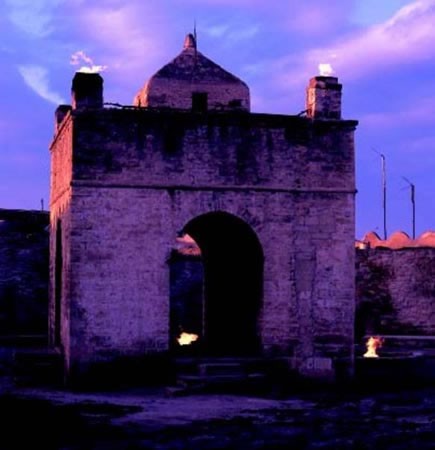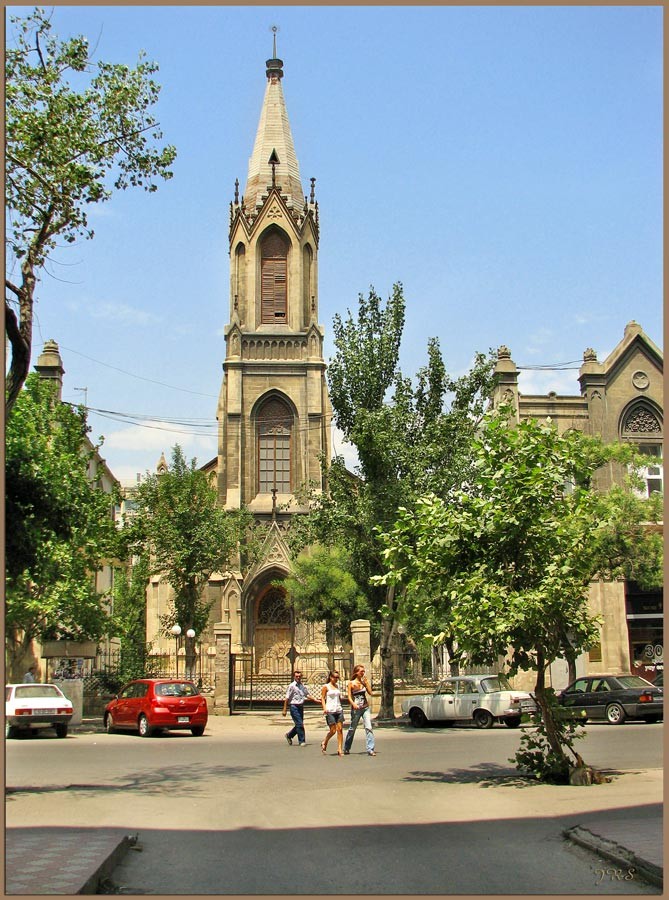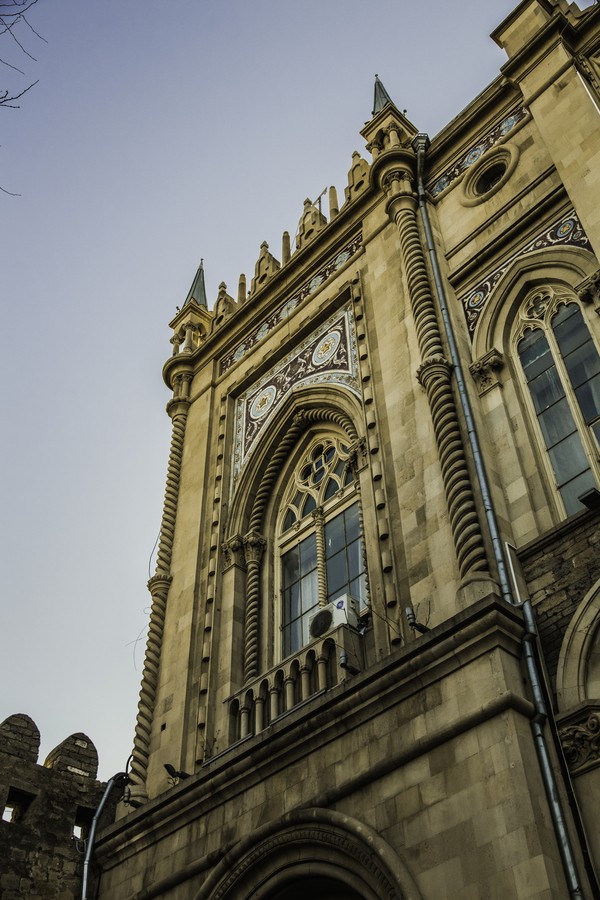Azerbaijan is one of the oldest spots of civilization, a country with a rich and ancient history. A rich cultural heritage has been created on its territory over the span of many millenniums, contributing to the treasure-house of World culture. The discovery of Azykh cave, the earliest habitation of man to be found in the world, and a number of habitations of the ancient Stone Age prove that Azerbaijan enters the zone of anthropoids to reveal the birthplace of mankind.
 The main traces of civilization are viewed in Azerbaijan. In the 3rd millennium B.C. the process of tribe formation was going on here and by the 1st millennium B.C. the first political formations had emerged. Azerbaijan State system was being formed in the 9th century B.C.: Manna state with high economic and cultural level had emerged. The pantheons of divinities were created. Manna believed in natural phenomena; the Sun, the Moon. The first part of the 6th century B.C. Manna was conquered by Media. The official religion was Zoroastrism, the spread of which was connected with self-kindled resources of oil and gas. A great part was played by the Atropatena and Caucasian Albania in the process of the formation of separate state structure on the territory of Azerbaijan in antiquity. The name of the country is connected with the name of the Atropatena ruler – Atropat which was later transformed into Azerbaijan. It is in Atropatena that the process of formation of Azerbaijan nationality began. In the 3rd -5th centuries the Azerbaijan state system was strengthening. Christianity was petrating into Azerbaijan. In Transcaucasus one of the first apostolic Christian churches appeared spiritual and secular life was progressing. At the beginning of the 5th century the Albanic alphabet was introduced and promoted the development of education. The unique monuments of culture and literature, architectural traditions of that period have been preserved to the present. Azerbaijan was conquered by Arabs at the beginning of the 8th century and made part of the Arab Khalifat as the vilayet Arran.
The main traces of civilization are viewed in Azerbaijan. In the 3rd millennium B.C. the process of tribe formation was going on here and by the 1st millennium B.C. the first political formations had emerged. Azerbaijan State system was being formed in the 9th century B.C.: Manna state with high economic and cultural level had emerged. The pantheons of divinities were created. Manna believed in natural phenomena; the Sun, the Moon. The first part of the 6th century B.C. Manna was conquered by Media. The official religion was Zoroastrism, the spread of which was connected with self-kindled resources of oil and gas. A great part was played by the Atropatena and Caucasian Albania in the process of the formation of separate state structure on the territory of Azerbaijan in antiquity. The name of the country is connected with the name of the Atropatena ruler – Atropat which was later transformed into Azerbaijan. It is in Atropatena that the process of formation of Azerbaijan nationality began. In the 3rd -5th centuries the Azerbaijan state system was strengthening. Christianity was petrating into Azerbaijan. In Transcaucasus one of the first apostolic Christian churches appeared spiritual and secular life was progressing. At the beginning of the 5th century the Albanic alphabet was introduced and promoted the development of education. The unique monuments of culture and literature, architectural traditions of that period have been preserved to the present. Azerbaijan was conquered by Arabs at the beginning of the 8th century and made part of the Arab Khalifat as the vilayet Arran.
Islam became the leading religion in Azerbaijan, creating mew traditions and culture. Azerbaijanis, like all other nations that accepted Islam, were called “Moslems” and participated in the development of Moslem culture, gave the world a brilliant gallery of scientists, poets and architects. In the medieval centuries there was a succession of states: Garagoyunly, Ag-gounly, Sefevids states were in power in a successive way. Azerbaijani people distinguish among other peoples with its specific image in the world culture. Cultural and literary specimen of this people created for centuries are tanned with love of life, feelings of freedom and independence.
 Grand works of art of our people such as “Kitabi Dada-Gorgud”, “Koroghly”, coryphaeus who have left indelible traces in the history of world civilization such as Nizamy Ganjavy, Afsalladdin Khagany, Khatib Tabrizy, Imadaddin Nasimy, Gatran Tabrizy, Mouhammad Fouzuly whose creative activities were devoted to praising world ideas of truth and justice, served to establish human ideals. Art lovers are still admired by the works of Safiyaddin Ourmavy, Ajamy Nakhchivaany, Sultan Mouhammad Tabrizy who gave pearls to the treasure of world culture. Our people have full right to be proud of the contribution given to world science.
Grand works of art of our people such as “Kitabi Dada-Gorgud”, “Koroghly”, coryphaeus who have left indelible traces in the history of world civilization such as Nizamy Ganjavy, Afsalladdin Khagany, Khatib Tabrizy, Imadaddin Nasimy, Gatran Tabrizy, Mouhammad Fouzuly whose creative activities were devoted to praising world ideas of truth and justice, served to establish human ideals. Art lovers are still admired by the works of Safiyaddin Ourmavy, Ajamy Nakhchivaany, Sultan Mouhammad Tabrizy who gave pearls to the treasure of world culture. Our people have full right to be proud of the contribution given to world science.
The name of our thinkers Nasraddin Tuisy, Aboulhassan Bahmanyar, Mirza Fataly Akhundov, Abashouly Aga Bakikhanov and others are well-known to world science. Heroism of such popular leaders as Javanshir and Babach has been turned into a school of patriotism, embodiment of courage and unification of people. Life and activity of Mouhammad Jahan Pahlavan, Gyzil Arslan, Ouzun Hassan, Shah Ismail Khatai and other statesmen developed love of Motherland and statehood in people, and have been turned to one of the major goals of our life. A rivalry between states to involve Azerbaijan into the sphere of their interests resulted in striking inner destabilization in 18th century. A number of independent state formations – Khanates appeared. The contradictions between Russia, Turkey and Iran deepened in the 18th-19th century. Wars were waged over Azerbaijan. The Turkmanchay Treaty of 1828 between Russia and Iran separated Azerbaijan and its people: the northern part of Azerbaijan was conquered by Russia, its southern part became a part of the Iranian state. The 20th century entered the history of the Azerbaijan people as the period of radical changes in socio-economic, political and cultural life. A range of upstream and downstream industrial branches were intensively developing in Azerbaijan. Baku turned into the world centre of oil extraction and refinery yielding more than half of the worlds and 95 % of Russia’s oil extraction totals. The cultural life enlivened.
Archaeologist dates the first human settlements in present day Azerbaijan to the Stone Age. Pre-historic cave dwellings have been excavated throughout Azerbaijan, one of the more important being the excavation at Gobustan, famous for its rock paintings.
The roots of present day Azerbaijan trace back to the fourth century B.C., with the emergence of the two kingdoms of Caucasian Albania in the north, and the Atropatan in the south. The latter takes its name from its founder, Atropat, a satrap of Alexander the Great. In fact many historians believe the word “Azerbaijan” itself derives from Atropatan, whereas others think that it means “The country of fire”.
First Azerbaijan’s Golden Age (9th -12th century A.D.) Shirvanshah dynasty’s reign (7th – 14th centuries A.D.) made the first Golden Age of Azerbaijan possible. Literature, Arts, Architecture and Science flourished in Azerbaijan. The great Azeri thinker and poet Nizami Ganjevi (12th century) created his literary masterpieces such as Khamsa.
Partition of Azerbaijan by Russia and Persia (1813 – 1828) . Subsequent centuries saw a decline of Safavid Empire. In the beginning of the 19th century Russia and Persia divided Azerbaijan along the Araz River. The North Azerbaijan came under Russian control, while Southern part went under the rule of Persia.
Oil Boom (late 19th – early 20th century)
 The mass extraction of oil drew the investors and entrepreneurs from all over the world to Baku oil fields. Oil boom gave an impetus to the emergence of Azerbaijani middle class and millionaire mentors. This period witnessed unprecedented renaissance in Azerbaijani national consciousness.
The mass extraction of oil drew the investors and entrepreneurs from all over the world to Baku oil fields. Oil boom gave an impetus to the emergence of Azerbaijani middle class and millionaire mentors. This period witnessed unprecedented renaissance in Azerbaijani national consciousness.
First Democratic Republic of the Islamic Orient (1918 – 1920)
Azerbaijani patriots under the leadership of Mehmet Emin Rasulzadeh established the first Azerbaijan Democratic Republic, recognized by European Powers. The parliament of the young republic included Azerbaijani as well as Russian, Armenian, Jewish and Georgian parties.
Second Azerbaijan’s Golden Age (15th -16th century A.D.)
In 1501 Shah Ismail (Khatai) the First, established the vast Azerbaijani (Safavids) Shah Ismail, was a wise ruler and talented poet. He established Azeri Turkish as a state language of the Safavids Empire and was respected by European Powers of that time.
Born out of Fire (“The Land of Fire” free again)
After 70 years of brutal Soviet communist rule the Azerbaijani people won their independence for the second time in this century. Many sons and daughters of Azerbaijan gave their lives at the altar of freedom. Azerbaijan is the only former Soviet republic with no Russian troops. Development of oil industry in cooperation with the Western companies promises new economic boom to the country. Despite the aggression, blockade and economic hardship Azerbaijani people are determined to preserve its independence and carry the torch of freedom and prosperity to the future.